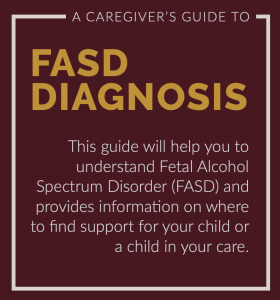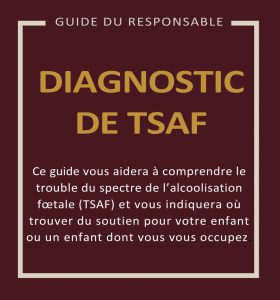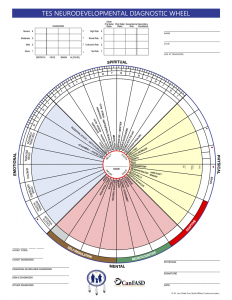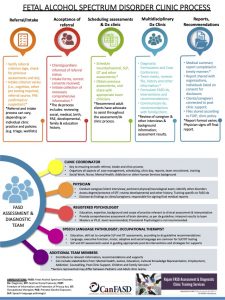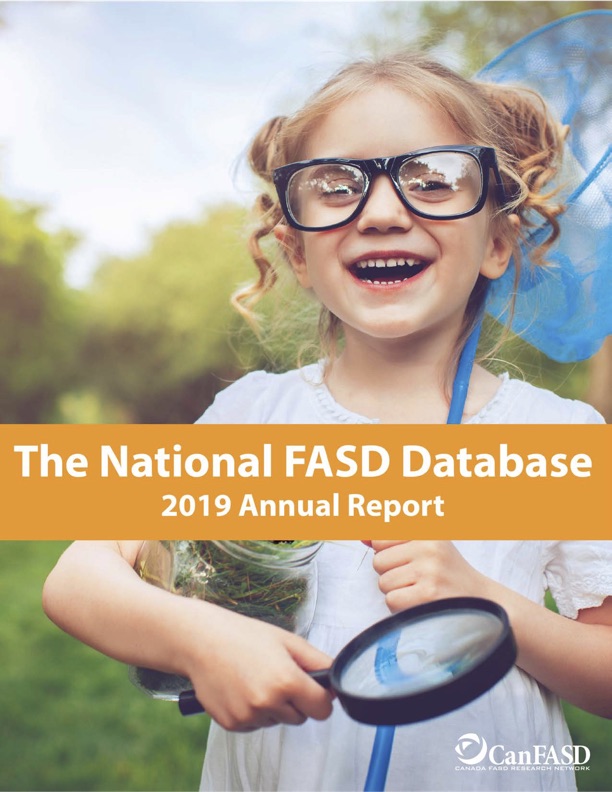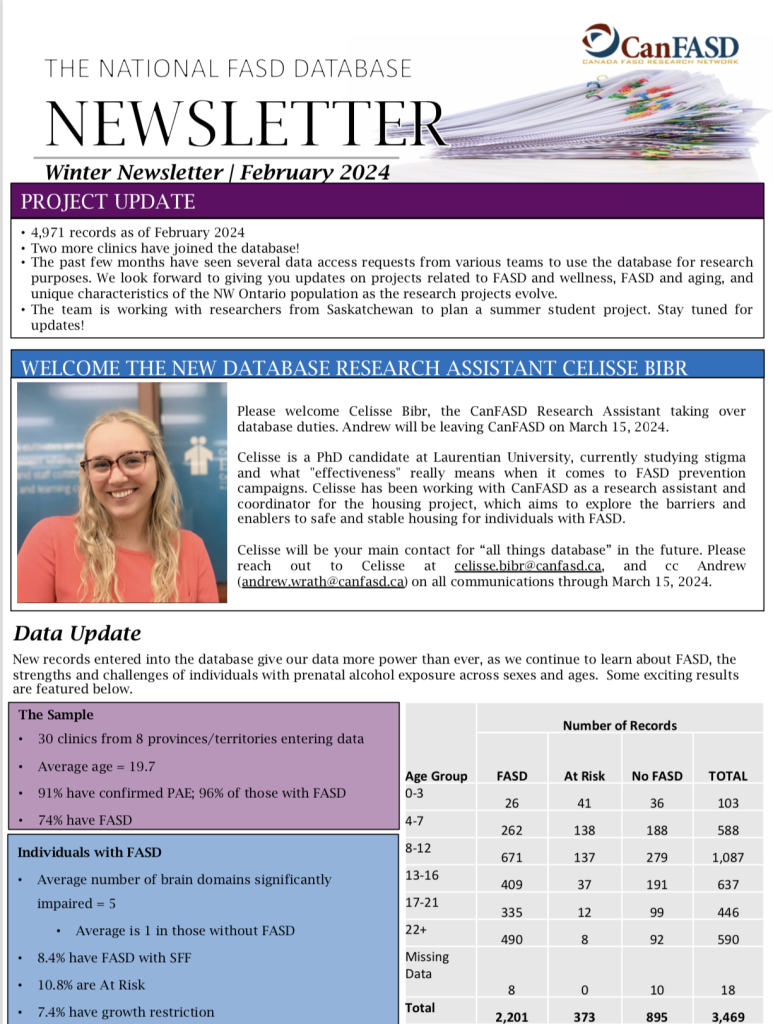Diagnosis
Although FASD is a lifelong disability, accurate diagnosis essential to improving outcomes. Early diagnosis is associated with fewer adverse outcomes later and life, but diagnosis at any age is important. Diagnosis can help identify an individual’s strengths and challenges, which allows individuals to set realistic and meaningful goals and expectations for themselves.
Diagnosis also connects them to the support and services they need. Appropriate and timely interventions – in education, employment, housing, emotional regulation, mental health, and more – can help to mitigate and improve some of the symptoms of FASD.
Above all, diagnosis gives individuals with FASD and their families answers. Caregivers often feel as sense of relief after a diagnosis as they now understand the underlying challenges their child faces. Through diagnosis, they become connected to the broader FASD community with whom they can share their experiences and grow their advocacy skills.
Guidelines for Assessing and Diagnosing FASD
A guideline for diagnosing FASD
Published in 2016, the updated Canadian guidelines for FASD diagnosis across the lifespan, incorporates new evidence and our improved understanding of FASD diagnosis.
These guidelines are meant to help assist multidisciplinary teams through this complex diagnosis, leading to improved health services and creating a positive impact on the health and well-being of children and adults with FASD across their lifespan.
Executive Summary | Appendix 1
Online Training for FASD Diagnosis
Want to learn more about screening, assessment, and diagnosis of Fetal Alcohol Spectrum Disorder (FASD)? Take our online Multidisciplinary Team Training for Diagnosis of FASD.
This accredited, online FASD curriculum, based on the 2016 Canadian guidelines, has been developed to assist professionals in learning the processes and procedures, and in developing the skill set needed to be effective members of a multidisciplinary diagnostic team.
Issue Papers
Papers summarizing key issues related to the diagnosis of FASD include:
Why FASD Diagnostic Assessment is Important (2023)
This issue paper outlines the importance of an FASD diagnostic assessment to supporting and improving outcomes for diagnosed individuals and their families.
Diagnostic Assessment of Preschoolers with Prenatal Alcohol Exposure (2023)
Diagnostic assessment of preschoolers offers an early opportunity to identify young children at risk for behavioural and learning difficulties and provide them with appropriate interventions but identification and assessment at this age can be difficult.
Key Journal Articles
These key journal articles, authored by members of the CanFASD Research Network and partners, explore various topics related to FASD diagnosis and assessment.
Latent classes of neurodevelopmental profiles and needs in children and adolescents with prenatal alcohol exposure
Kaitlyn McLachlan, Meenu Minhas, Chantel Ritter, Kathleen Kennedy, Vannesa Joly, M. Faitakis, Jocelynn Cook, Kathy Unsworth, James MacKillop & Jacqueline Pei
Alcohol: Clinical and Experimental Research, February 2023
Fetal alcohol spectrum disorder diagnostic clinic capacity in Canadian Provinces and territories (open access)
Svetlana Popova, Danijela Dozet, Valerie Temple, Audrey McFarlane, Jocelynn Cook & Larry Burd
PLoS One, 2024
Challenges and strengths experienced by fetal alcohol spectrum disorder diagnostic clinics in Canada
Kelly D. Harding, Colleen Burns, Christine Lafontaine, Andrew Wrath, Alicia Groom, Katherine Flannigan, Kathy Unsworth & Audrey McFarlane
Journal of Intellectual & Developmental Disability, 2024
International Survey of Specialist Fetal Alcohol Spectrum Disorder Diagnostic Clinics: Comparison of Diagnostic Approach and Considerations Regarding the Potential for Unification (open access)
Natasha Reid, Dianne C. Shanley, Jayden Logan, Codi White, Wei Liu & Erinn Hawkins
International Journal of Environmental Research and Public Health, 2022
Assessing for Fetal Alcohol Spectrum Disorder – A Survey of Assessment Measures Used in Alberta, Canada
Kelly Coons-Harding, Katherine Flannigan, Colleen Burns, Hasmukhlal Rajani & Brent Symes
Journal of Population Therapeutics & Clinical Pharmacology, 2019
Deferred diagnosis in children assessed for fetal alcohol spectrum disorder
Katherine Flannigan, Kamaldeep Gill, Jacqueline Pei, Gail Andrew, Hasu Rajani, Audrey McFarlane, Teresa O’Riordan, Brent Symes & Carmen Rasmussen
Applied Neuropsychology: Child, 2018
Fetal alcohol spectrum disorder: A guideline for diagnosis across the lifespan
Jocelynn L. Cook, Courtney R. Green, Christine M. Lilley, Sally M. Anderson, Mary Ellen Baldwin, Albert E. Chudley, Julianne L. Conry, Nicole LeBlanc, Christine A. Loock, Jan Lutke, Bernadene F. Mallon, Audrey A. McFarlane, Valerie K. Temple and Ted Rosales
CMAJ, 2016
FASD Prevalence
Research on the prevalence of FASD is critical to understand the scale of the disability in our communities and to identify opportunities to support healthy pregnancies. This research can inform decisions about how we allocate resources and services to support healthy families, and it can help to monitor how effective prevention efforts are.
However, FASD prevalence rates are difficult to measure because of challenges with identification, screening, and diagnosis. Emerging evidence on FASD prevalence suggests conservative rates of 8% in the general population in North America and at least 4% in Canada. Rates are even higher in certain populations who can benefit from additional supports tailored to their unique needs.
Issue Papers
FASD Prevalence in Special Populations (2024)
Emerging evidence on FASD prevalence suggests conservative rates of at least 4%. However, researchers report substantially higher rates in certain groups, like children in care and those in the criminal legal system.
The Prevalence of Fetal Alcohol Spectrum Disorder (2024)
FASD prevalence findings have not always been consistent as, over the years, researchers have used different methodologies in different regions and populations. This work shares the most up-to-date findings in FASD prevalence research, suggesting rates of at least 4% in Canada.
Reports and Resources
FASD Prevalence in Corrections Study
In 2016, the Government of Yukon completed a three-year study to find out how many in people in custody or on probation in the Yukon are affected by Fetal Alcohol Spectrum Disorder (FASD).
Developing a Multi-source Surveillance System for Fetal Alcohol Spectrum Disorder and Prenatal Alcohol Exposure (SSFASD/PAE)
Svetlana Popova, Danijela Doze, Lisha Di Gioacchino, Valerie Temple, Jocelynn Cook, Audrey McFarlane & Jürgen Rehm
CAMH, Report prepared for the Public Health Agency of Canada
version français
World Health Organization International Study on the Prevalence of Fetal Alcohol Spectrum Disorder (FASD) – Canadian Component (2018)
Svetlana Popova, Shannon Lange, Albert E. Chudley, James N. Reynolds & Jürgen Rehm
Institute for Mental Health Policy Research, Centre for Addiction and Mental Health
Key Research Articles
Implications of Higher Than Expected Prevalence of Fetal Alcohol Spectrum Disorders
Shannon Lange, Jürgen Rehm & Svetlana Popova
JAMA, February 2018
Prevalence of Fetal Alcohol Spectrum Disorders in 4 US Communities
Philip A. May, Christina D. Chambers, Wendy O. Kalberg, et al.
JAMA, February 2018
Supplementary content
Global Prevalence of Fetal Alcohol Spectrum Disorder Among Children and Youth: A Systematic Review and Meta-analysis
Shannon Lange, Charlotte Probst, Gerrit Gmel, Jürgen Rehm, Larry Burd & Svetlana Popova
JAMA Pediatrics, 2017
Supplementary content
Co-morbidity of Fetal Alcohol Spectrum Disorder: A systematic literature review and meta-analysis
Popova, S., Lange, S., Shield, K., Mihic, A., Chudley, A. E., Mukherjee, R. A. S., Bekmuradov, D., & Rehm, J.
The Lancet, January 2016
Screening and Identification
FASD is a common disability, but it often goes under-recognized and under-diagnosed. FASD screening is a process that can help identify people who have prenatal alcohol exposure and are exhibiting behaviours that may be associated with FASD. Professionals can then refer them to the appropriate FASD diagnostic services.
Reports and Resources
Increasing Capacity to Identify and Support Individuals with Fetal Alcohol Spectrum Disorder (FASD) and Complex Neurodevelopmental Needs in British Columbia
Kaitlyn McLachlan, Emma Jewell, Martina Faitakis, Jacqueline Pei, Melissa Tremblay, Mansfield Mela, Katherine Flannigan, Kathy Unsworth & Meghan Schuurman
February 2024
Key Research Articles
Screening approaches for identifying fetal alcohol spectrum disorder in children, adolescents, and adults: A systematic review
Melissa Grubb, Ariella Golden, Abigail Withers, Daniella Vellone, Arlene Young & Kaitlyn McLachlan
Alcoholism: Clinical & Experimental Research, 2021
Best Practice Guide for FASD Assessment and Diagnostic Clinics – This Best Practices Guide for FASD comprises evidence-informed practices that describe high-priority areas in the diagnostic clinic that are central to quality and safety.
CanFASD Caregiver’s Guide to Diagnosis — This guide will help you to understand Fetal Alcohol Spectrum Disorder (FASD) and provides information on where to find support for your child or a child in your care.
CanFASD Guide du Responsable Diagnostic de TSAF – Ce guide vous aidera à comprendre le trouble du spectre de l’alcoolisation fœtale (TSAF) et vous indiquera où trouver du soutien pour votre enfant ou un enfant dont vous occupez.
The Disability Tax Credit (DTC) is a non-refundable tax credit that helps people with prolonged disabilities or their supporting persons reduce the amount of income tax they may have to pay.
DTC Frequently Asked Questions
DTC Application Guide for Physicians
DTC Letter Template for Physicians
Tips for paediatricians completing the DTC Form
DTC General Information
FASD Diagnostic FAQ Cards — These cards provide answers to frequently asked questions about FASD diagnosis and where in your province you can find clinics for diagnosis and assessment.
Infographics
National FASD Database
CanFASD launched the first and only comprehensive FASD database in the world, providing key insight into the profile of individuals with FASD.
About the National FASD Database
The database collects real-time data from FASD diagnostic clinics across Canada, helping inform policy and practice at a national level. Information from the database provides data back to each of the diagnostic clinics to help them inform and support their own work.
The database provides opportunities for national education and training to improve services for individuals with this neurodevelopmental disorder.
CanFASD’s national database is important for understanding the relationship between diagnostic capacity and service availability for individuals with FASD. In-depth research will inform policy decision and resource allocations pertaining to health services provided to those with FASD. Currently, there are more than 25 clinics from eight provinces and territories participating.
For more information, please contact Celisse Bibr <celisse.bibr@canfasd.ca>.
Related Research Articles
Characterising fetal alcohol spectrum disorder in Canada: a national database protocol study
Jocelynn Cook, Kathy Unsworth & Katherine Flannigan
BMJ Open, 2021
Reports & Resources
Information for Participating Diagnostic Clinics
Participating clinics will receive:
- Bi-annual data about their clinics
- Aggregate data from other participating clinics
- Quarterly status updates in the form of newsletters
- Community of practice where participating clinics can address
The National FASD Database Newsletter
The National FASD Database Newsletter – Summer 2025
The National FASD Database Newsletter – Winter 2024
The National FASD Database Newsletter – Winter 2022
The National FASD Database Newsletter – Fall 2021
The National FASD Database Newsletter – Spring 2021
The National FASD Database Newsletter – Fall 2020
The National FASD Database Newsletter – Winter 2019/2020
The National FASD Database Newsletter – Summer 2019
The National FASD Database Newsletter – Winter 2018-2019
The National FASD Database Newsletter – Winter 2017-2018
The National FASD Database Newsletter – Fall 2017
Clinic Resources
Database Questions as in REDCap
DataForm Data Dictionary Codebook
National FASD Database Slides for Policymakers

